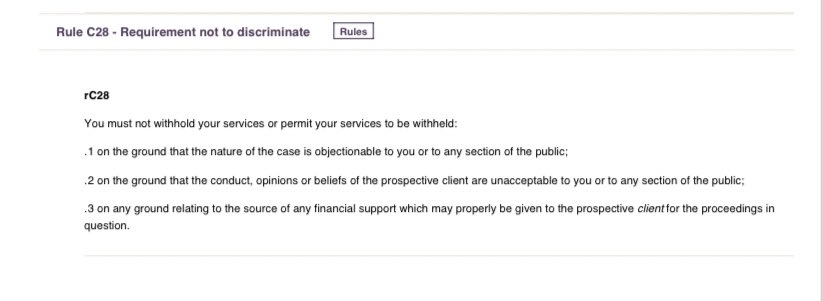
Barristers are not our cases. We do not choose our clients because we believe in their cause. If we receive instructions to represent in legal proceedings, we are ethically obliged to act.
Critics of @DinahRoseQC misunderstand the function of the Bar.
lawgazette.co.uk/news/lawyers-r…
Critics of @DinahRoseQC misunderstand the function of the Bar.
lawgazette.co.uk/news/lawyers-r…
It is the same misunderstanding that causes the Home Secretary to attack “activist lawyers” for representing people in immigration cases; the Prime Minister to deride criminal barristers as “lefty do-gooders”.
We take the cases we are given. That way nobody goes unrepresented.
We take the cases we are given. That way nobody goes unrepresented.
Barristers have a duty not to refuse a case because of its objectionable nature or conduct/beliefs of the client.
If we refused to act for unpopular clients because of public or political pressure, it would be professional misconduct and the rule of law would quickly crumble.
If we refused to act for unpopular clients because of public or political pressure, it would be professional misconduct and the rule of law would quickly crumble.

As an aside, much of the criticism misunderstands fundamentally the issue in the case in question. This excellent article by @JoshuaRozenberg is required reading.
https://twitter.com/joshuarozenberg/status/1354739794824355840
This furore has uncomfortable echoes of the case of Ronald Sullivan Jr, a Dean at Harvard who was hounded out of Harvard by students after he agreed to represent Harvey Weinstein.
vanityfair.com/hollywood/2019…
vanityfair.com/hollywood/2019…
Critics are more than entitled to take a view on a case. They are more than entitled to hope for a particular outcome, and to challenge or despise government policy. But attacking the lawyer professionally bound to act? Inexcusable.
• • •
Missing some Tweet in this thread? You can try to
force a refresh



